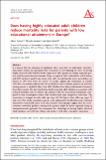Files in this item
Does having highly educated adult children reduce mortality risks for parents with low educational attainment in Europe?
Item metadata
| dc.contributor.author | Sabater, Albert | |
| dc.contributor.author | Graham, Elspeth | |
| dc.contributor.author | Marshall, Alan | |
| dc.date.accessioned | 2019-07-19T10:30:02Z | |
| dc.date.available | 2019-07-19T10:30:02Z | |
| dc.date.issued | 2019-07-19 | |
| dc.identifier | 259207659 | |
| dc.identifier | 2e236c78-8110-4c8c-a3b7-dc7e52c22404 | |
| dc.identifier | 85069486835 | |
| dc.identifier | 000587997800005 | |
| dc.identifier.citation | Sabater , A , Graham , E & Marshall , A 2019 , ' Does having highly educated adult children reduce mortality risks for parents with low educational attainment in Europe? ' , Ageing & Society , vol. First View . https://doi.org/10.1017/S0144686X19000795 | en |
| dc.identifier.issn | 0144-686X | |
| dc.identifier.uri | https://hdl.handle.net/10023/18132 | |
| dc.description | This work was supported by the ESRC Centre for Population Change (grant number ES/K007394/1); and the University of St Andrews. | en |
| dc.description.abstract | It is known that the education of significant others may affect an individual’s mortality. This paper extends an emerging body of research by investigating the effect of having highly educated adult children on the longevity of older parents in Europe, especially parents with low educational attainment. Using a sample of 15,015 individuals (6,620 fathers and 8,395 mothers) aged 50 and above, with 1,847 recorded deaths, over a mean follow-up period of 10.9 years from the Survey of Health, Ageing and Retirement in Europe (SHARE), we examine whether the well-established socioeconomic gradient in mortality among parents is modified when their adult children have higher educational attainment than their parents. We find that having highly educated adult children is associated with reduced mortality risks for fathers and mothers with low educational attainment, compared to their counterparts whose adult children have only compulsory education. The association is stronger in early older age (ages 50 to 74) than in later older age (ages 75 and over). Part of the association appears to be explained by health behaviours (physical (in)activity) and health status (self-rated health). Our findings suggest that the socioeconomic-mortality gradient among older parents might be better captured using an intergenerational approach that recognises the advantage of having highly educated adult children, especially for fathers and mothers with only compulsory education. | |
| dc.format.extent | 36 | |
| dc.format.extent | 1164729 | |
| dc.language.iso | eng | |
| dc.relation.ispartof | Ageing & Society | en |
| dc.subject | Mortality | en |
| dc.subject | Older parents | en |
| dc.subject | Adult children | en |
| dc.subject | Intergenerational transfers | en |
| dc.subject | Education | en |
| dc.subject | H Social Sciences (General) | en |
| dc.subject | HQ The family. Marriage. Woman | en |
| dc.subject | L Education | en |
| dc.subject | 3rd-DAS | en |
| dc.subject.lcc | H1 | en |
| dc.subject.lcc | HQ | en |
| dc.subject.lcc | L | en |
| dc.title | Does having highly educated adult children reduce mortality risks for parents with low educational attainment in Europe? | en |
| dc.type | Journal article | en |
| dc.contributor.sponsor | Economic & Social Research Council | en |
| dc.contributor.institution | University of St Andrews. Centre for Research into Equality, Diversity & Inclusion | en |
| dc.contributor.institution | University of St Andrews. School of Geography & Sustainable Development | en |
| dc.identifier.doi | https://doi.org/10.1017/S0144686X19000795 | |
| dc.description.status | Peer reviewed | en |
| dc.date.embargoedUntil | 2019-07-18 | |
| dc.identifier.grantnumber | ES/K007394/1 | en |
This item appears in the following Collection(s)
Items in the St Andrews Research Repository are protected by copyright, with all rights reserved, unless otherwise indicated.

